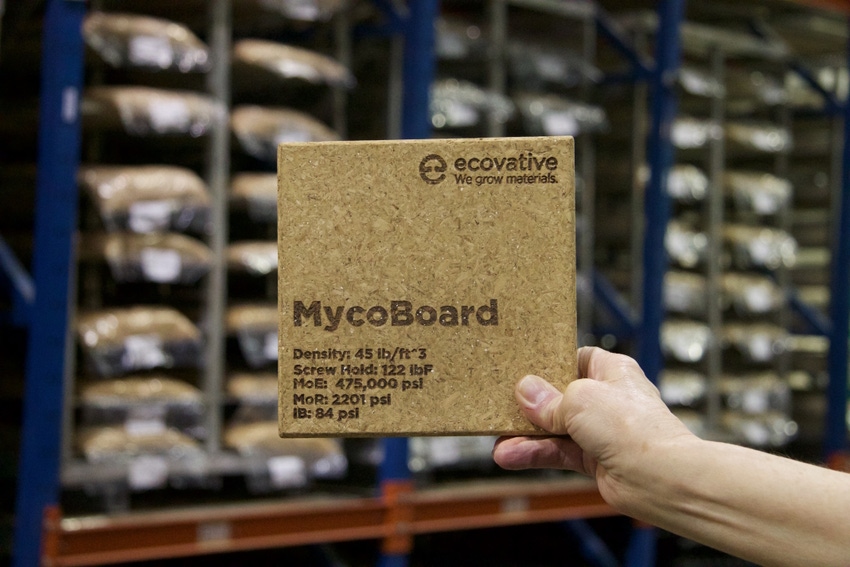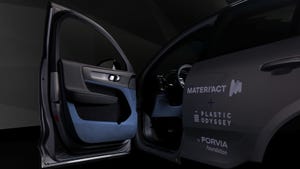August 8, 2016

 Since the successful launch of its MycoFoam packaging solution, Ecovative, the New York-based biomaterials company that has successfully brought mycelium-based biomaterials to the market, has expanded its scope to areas other than packaging alone. The company has developed a new type of engineered wood panel for furniture and other interior applications that, it says, is “premium, customizable, and certified sustainable”.
Since the successful launch of its MycoFoam packaging solution, Ecovative, the New York-based biomaterials company that has successfully brought mycelium-based biomaterials to the market, has expanded its scope to areas other than packaging alone. The company has developed a new type of engineered wood panel for furniture and other interior applications that, it says, is “premium, customizable, and certified sustainable”.
Rather than being bound together using formaldehyde and other toxic resins, MycoBoard panels are literally grown together, using Ecovative’s mResin adhesive system. Derived from the mycelium in mushrooms, this “nature’s glue” is formaldehyde-free, safe, and healthy. The product offers acoustic and fire-resistant properties and can be molded into custom shapes or pressed into boards, making it an ideal solution for the architectural and design community.
Earlier this year, Eben Bayer, Ecovative co-founder and CEO addressed the U.S. Chamber of Commerce Foundation’s 6th annual Sustainability Forum, where he talked about his vision for a sustainable economy powered by “nature’s toolkit,” biological technology.
“The North American mill industry is ripe for innovation. It faces a costly challenge in addressing its formaldehyde problem. While much of the research has focused on options to lower the levels of the toxic chemical mix required to produce engineered wood, we shifted the focus, finding the answers in biology,” he told his audience. “Existing mills across the country can be upgraded with biology to produce a safer, more sustainable product that is healthier for their customers and their bottom line.”
The EPA agrees that a safer product is desirable. In its Formaldehyde Emission Standards for Composite Wood Products; Final Rule--Prepublication Copy, it noted that the “EPA encourages laminated product producers and the wood products industry to explore all avenues for reducing formaldehyde emissions from composite wood products. In addition to established resins, such as soy-based resins or phenol formaldehyde resins, new resin technologies may be developed that provide adequate performance while contributing minimal formaldehyde emissions.
It explicitly mentions Ecovative as an example of a new alternative to regulated composite wood products, writing that “in 2014, EPA awarded a grant through EPA’s Small Business Innovation Research program competition to Ecovative Design, LLC. Ecovative makes packaging, building materials (furniture and panels) and automotive products by growing them from agricultural byproducts and mycelium, a fungal network of threadlike cells that are like the roots of mushrooms. These materials are not hardwood plywood, particleboard, or MDF, and thus are not subject to this final regulation.”
Eben Bayer welcomes the EPA’s new lower urea-formaldehyde emission standards and was “thrilled” to be referenced as a potential solution in the guidelines. “At Ecovative we believe that less bad is not enough. That’s why we are scaling our mResin adhesive system for mill level deployments as well as designing, developing, and selling biofabricated furniture for the home and office. All are grown from natural materials without any added toxic glues,” Bayer said.
Currently, Ecovative is working with mills across North America and Europe to pilot its mResin adhesive system. “By using a living organism to transform existing feedstocks, primarily wood fiber, into glue, we can help mills raise their product performance rather than just focusing on meeting these lower emission standards. While our pilot program is currently full, we hope to have capacity to work with other mills starting in 2017,” said Gavin McIntyre, Ecovative co-founder and Chief Scientist.
MycoBoard panels are now available directly from Ecovative, as well as through its west coas t distribution partner Trinity Innovations. The panels are now used commercially in furniture, including in Gunlocke’s award winning Savor chair, and in a new line of sustainable commercial wall tiles produced for the home and office under its Ecovative Interiors line.
t distribution partner Trinity Innovations. The panels are now used commercially in furniture, including in Gunlocke’s award winning Savor chair, and in a new line of sustainable commercial wall tiles produced for the home and office under its Ecovative Interiors line.
Through the Federal Small Business Innovation Research (SBIR) program, Ecovative has received Federal research funding from the Environmental Protection Agency (EPA), the National Science Foundation (NSF), and the US Department of Agriculture. Ecovative was founded in 2007, and received its first SBIR program related grant in 2008. In 2013 Ecovative received the SBA’s prestigious Tibbetts Award honoring high-tech small businesses “for the critical role they play in research and development for the government and for their success in driving innovation and creating new jobs.”
About the Author(s)
You May Also Like


